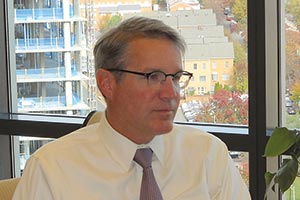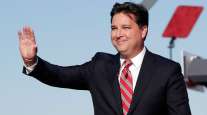ATA to Expedite Task Force for Infrastructure Funding

This story appears in the Nov. 21 print edition of Transport Topics.
Sensing a significant opportunity to advance trucking’s legislative and regulatory agendas in the nation’s capital, American Trucking Associations President Chris Spear said he will accelerate the creation of an ATA infrastructure task force to the end of this month.
Spear first floated the task force idea in October at the federation’s Management Conference & Exhibition and said it should be staffed and running during February. However, public statements by President-elect Donald Trump on his desire to create a 10-year, $1 trillion infrastructure program during the first 100 days after his Jan. 20 swearing-in convinced Spear to speed up the process.
Spear, ATA’s leader since July, said in a Nov. 14 letter to members that it is crucial to make “sure that ATA is in a position to help the next administration and Congress shape and pass a dedicated and sustainable funding package for our nation’s roads and bridges.”
“What an opportunity,” said Kevin Burch, president of Jet Express Inc. and ATA chairman, in endorsing the acceleration of the task force. Burch drew an analogy to football, saying this is an example of ATA moving to offense from defense and was pleased there have been ATA discussions with personnel from both presidential campaigns dating to September, well before Election Day.
“We’ve already been doing our homework,” he added.
Spear said the Trump transition office’s two leading people on transportation are Martin Whitmer, a founder of the lobbying firm Whitmer & Worrall, and Ado Machida, also a lobbyist and a former domestic policy aide to Dick Cheney when he was vice president.
Spear and Burch said the task force would be made up of CEO-level carrier executives from a broad spectrum of company types and state trucking association executives. No decision has yet been made on the size of the group.
Spear said the agenda for the early Trump administration is “daunting” and that a single issue such as health care, business taxes — which could be linked to infrastructure, immigration reform or the debt ceiling would be difficult, much less combining several or maybe all of those topics.
Beyond infrastructure funding, Spear said important federal issues coming up soon for trucking are business tax reform; a careful look at international trade, especially within North America; a permanent solution for the restart provision of federal hours of service for drivers; and pre-emption of state regulation, especially by California, on certain aspects of trucking within the context of the Federal Aviation Administration Authorization Act, also known as F4A.
Other organizations in Washington are also inter- ested in Trump’s infrastructure proposal.
The American Road & Transportation Builders Association’s reading of the electoral tea leaves is that “voters want transportation investment.” That conclusion was based on an assessment of voters’ approval of state and local ballot issues on transportation.
The organization representing state departments of transportation observed in a Nov. 10 blog posting that its leadership also had been discussing infrastructure with the campaigns.
“Officials from a number of industry groups, including the American Association of State Highway and Transportation Officials, had been meeting with representatives of both campaigns’ transition teams about infrastructure issues. AASHTO Executive Director Bud Wright also had offered the association’s expertise to help transition teams develop detailed project and funding plans,” the AASHTO Journal said.
Historically, ATA has backed road building through the federal Highway Trust Fund, well stocked with fuel-tax revenue from levies on diesel and gasoline. The trade federation has consistently called on Congress to raise the rate for paying fuel taxes, as long as the money is dedicated to roads and bridges — a suggestion that Congress has consistently declined to implement.
The federal fuel tax is 24.4 cents a gallon for diesel and 18.4 cents per gallon for gasoline.
Spear said an increase in fuel-tax rates, and then indexing them for inflation, is still the best policy solution but that ATA needs to be open to other ideas.
“We’ll need a number of robust funding sources,” he said.
David Manning, president of TCW Inc. and ATA’s first vice chairman, said trucking needs to adapt to political realities.
“When we evaluate these funding mechanisms, we need to start with the universe of what’s possible and then narrow it down,” said Manning, whose company is active in intermodal shipping.
“It’s important to go through this exercise. We don’t want to be frozen out of the discussion,” Manning said, adding that could happen if trucking sticks rigidly to fuel-tax increases to the exclusion of other possibilities.
Manning said additional transportation funding provided by trucks could take a different form than what automobile drivers might pay. As an example, the diesel tax might go up, but car drivers might pay more in a different way.




